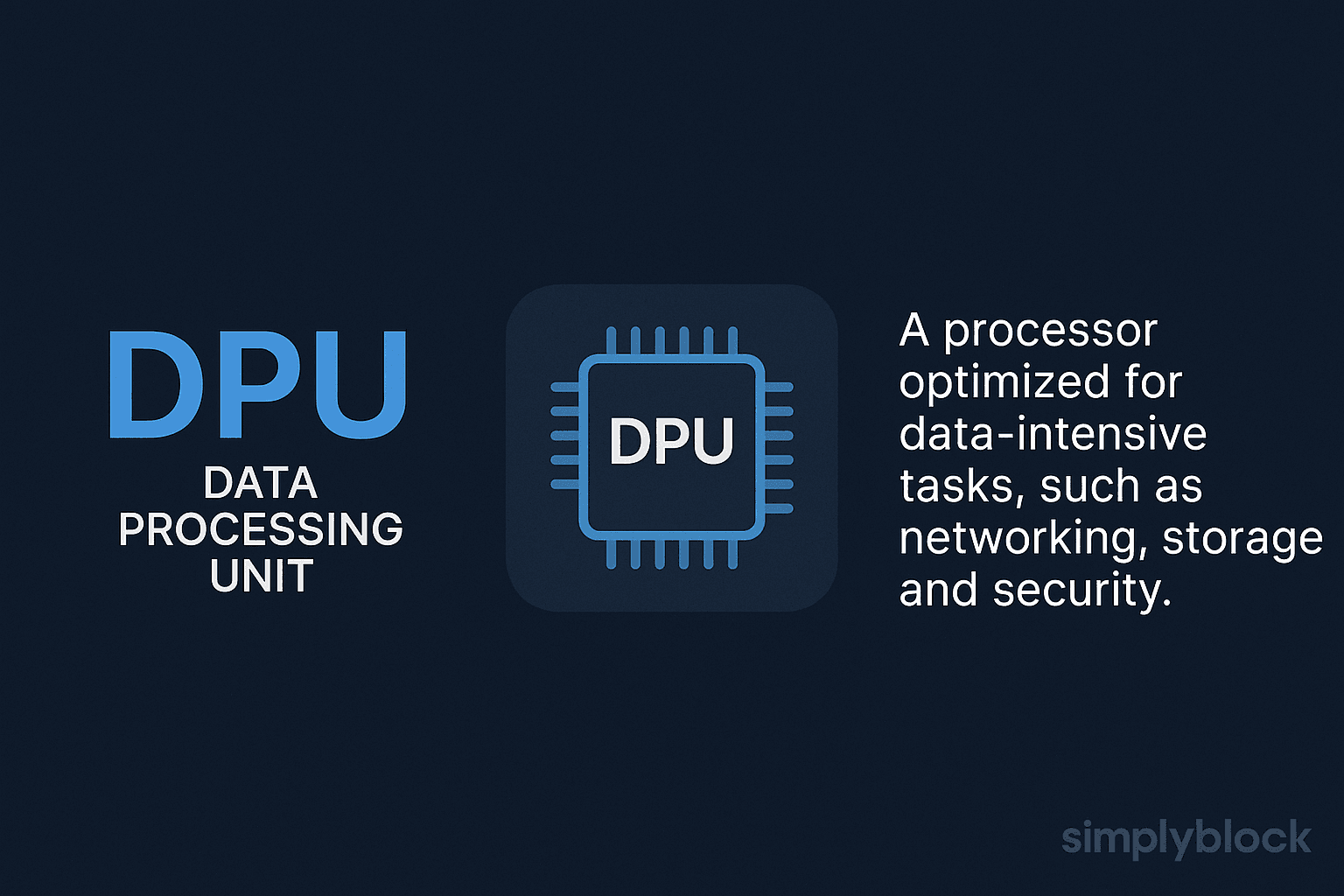DPU
Terms related to simplyblock
A Data Processing Unit (DPU) is a specialized processor designed to handle high-throughput data movement and infrastructure tasks traditionally offloaded to the CPU. While CPUs focus on running application logic and GPUs handle parallel computation for tasks like AI and graphics, the DPU is engineered to manage networking, storage, and security workloads, freeing up CPU cores for critical application-level performance. DPUs typically incorporate programmable processing cores, high-speed network interfaces, and direct memory access engines.
In environments where NVMe, Kubernetes, and disaggregated infrastructure dominate, DPUs are an essential architectural layer, enabling secure, high-performance communication between storage devices and compute workloads.
How a DPU Works in Storage Infrastructure
DPUs operate by offloading data path operations such as packet processing, encryption, compression, storage virtualization, and telemetry from the CPU. This capability becomes especially valuable in software-defined storage environments like simplyblock’s distributed NVMe/TCP stack, where minimizing CPU overhead translates to lower latency and higher IOPS.
Because DPUs interact directly with networking and storage hardware, they can manage data flows efficiently using technologies like RDMA or NVMe-over-Fabrics, including NVMe/TCP, without congesting system CPUs. These operations are performed at line rate with minimal intervention from the host OS.

DPU vs CPU vs GPU
Here’s a short comparison that highlights the role of a DPU in contrast to traditional processors:
Before reviewing the table, note that DPUs are not replacements for CPUs or GPUs—they are complementary hardware, particularly impactful in hybrid storage, SAN alternatives, and hyper-converged deployments.
| Component | Primary Function | Optimized For | Example Use Cases |
|---|---|---|---|
| CPU | General-purpose compute | Application logic | Web servers, databases |
| GPU | Parallel processing | AI, ML, graphics | Neural network training |
| DPU | Data movement & I/O processing | Networking, storage, security | NVMe-oF, firewalls, Kubernetes CNI |
Relevance in Kubernetes and Software-Defined Storage
DPUs offer significant acceleration in containerized environments like Kubernetes, where persistent volumes and CSI interfaces require storage and network orchestration. A DPU-enabled node can isolate noisy neighbor traffic, enforce quality of service (QoS), and process storage traffic directly—ideal for multi-tenant Kubernetes clusters managed with simplyblock QoS features.
They are also useful in implementing MAUS (Modular, Adaptive, Unified, Shared-everything) storage architecture, as DPUs can dynamically handle metadata operations and tiering logic between NVMe and other devices.
Benefits of DPU-Accelerated Infrastructure
Deploying DPUs unlocks several benefits, particularly when combined with NVMe-over-TCP protocols or erasure-coded storage:
- Reduced CPU Utilization: Frees CPUs for business logic and database execution.
- Improved Network Throughput: DPUs can process traffic inline at wire speed.
- Zero Trust and Security at Scale: Built-in crypto engines enable TLS/IPSec at line rate.
- Storage Disaggregation: Supports NVMe-oF and remote volume mapping.
- Hyper-Converged Flexibility: Ideal for scaling out SDS without bottlenecking nodes.
DPU Use Cases Across Industries
Data Processing Units are seeing rapid adoption in several domains:
- Cloud Providers: Offloading virtual switching and storage I/O.
- Telecom & 5G: Real-time packet inspection and slicing.
- AI/ML Infrastructure: Managing the data pipeline between fast storage and GPUs.
- Enterprises Running Distributed Storage: Especially where hybrid deployments require fine-grained workload isolation.
DPU in the Simplyblock Ecosystem
Simplyblock integrates with modern networking stacks to take advantage of DPU-based offloading. In environments using NVMe/TCP or aiming for an alternative to legacy SAN, DPUs facilitate reduced latency and consistent IOPS performance. These benefits are critical when running transactional systems like PostgreSQL in Kubernetes or scaling read-heavy cloud-native databases.
Related Terms
For a more complete understanding of where DPUs fit, it helps to review the following:
- NVMe Over Fabrics (NVMe-oF)
- Disaggregated Storage Architecture
- Edge Storage Infrastructure
- Kubernetes Storage Optimization
- OpenStack Storage Solutions
You can also explore the broader implications of IOPS and latency tuning in our article on IOPS, Throughput & Latency Explained.
External Resources
- NVIDIA BlueField DPU Overview (nvidia.com)
- What is a DPU? (wikipedia.org)
- OCP NIC 3.0 Specification (Open Compute Project)
Questions and Answers
A DPU (Data Processing Unit) is a specialized processor that offloads networking, storage, and security tasks from the CPU. It enhances performance and efficiency by handling low-level data operations, especially in cloud, AI, and software-defined storage environments.
While CPUs handle general computing and GPUs accelerate parallel workloads like AI, DPUs are optimized for infrastructure tasks like packet routing, storage virtualization, and encryption. This separation boosts system performance and frees up CPUs for application logic.
Yes, DPUs are well-suited for accelerating NVMe over TCP traffic, improving IOPS, reducing CPU overhead, and enabling scalable, high-performance disaggregated storage without sacrificing latency.
Absolutely. In Kubernetes, DPUs enhance networking, security, and storage performance, particularly in high-density clusters. Combined with Kubernetes-native storage, they help optimize throughput and isolation in multi-tenant workloads.
Yes. Many DPUs include built-in hardware accelerators for encryption at rest, TLS termination, and firewall functions. Offloading these tasks enhances security without burdening the main CPU, improving both compliance and performance.
